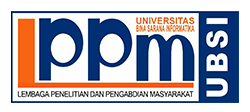UPAYA PEMULIHAN INDUSTRI PARIWISATA DALAM SITUASI PANDEMI COVID -19
Sari
ABSTRAK
Pandemi COVID-19, Indonesia mengalami keterpurukan hampir seluruh industri kecuali bidang kesehatan, farmasi kegiatan sosial, informasi dan komunikasi, pengadaan air bersih, pengelolaan sampah, serta limbah daur ulang. Sektor yang paling terdampak yaitu transportasi, travel, gudang dan sektor penyediaan akomodasi serta makan. Kemudian sektor yang lain adalah sektor pariwisata di Indonesia, sekitar 11,83% pekerja Indonesia berada sektor Industri pariwisata. Tujuan dari penelitian ini adalah meninjau dampak dari Covid -19 yang mengakibatkan turunnya sektor industri pariwisata di Indonesia dan juga merespon dari kebijakan Pemerintah agar penanganan dampak Covid -19 terhadap sektor pariwisata dapat dilakukan dengan baik dan pariwisata kembali normal dengan prosedural kesehatan. Penelitian ini menggunakan metode deskriptif kualitatif dan data untuk penelitian ini berdasarkan pada studi kepustakaan berupa buku, literature, jurnal, artikel mengenai industri pariwisata, serta cara pemulihannya pada era pandemi. Kunjungan wisatawan mancanegara berdasarkan data dari Kementrian Pariwisata dan Ekonomi Kreatif, ke Indonesia bulan Agustus 2020 mengalami penurunan sebesar -89,22% dibandingkan Agustus 2019. Upaya pemulihan sektor pariwisata ada tiga strategi yang diterapkan untuk mempercepat pemulihan pariwisata adalah Inovasi adalah hal utama dan harus ada perubahan mendasar saat ini. Inovasi, Adaptasi beradaptasi dengan kondisi pandemi yaitu meningkatkan penerapan ‘CHSE' alias Cleanliness (Kebersihan), Health (Kesehatan), Safety (Keamanan), dan Environment (Ramah lingkungan) dan Kolaborasi.
Kata kunci : Industri Pariwisata, Covid-19, Pemulihan Pariwisata
ABSTRAK
The COVID-19 pandemic, Indonesia experienced a downturn in almost all industries except for health, pharmacy, social activities, information and communication, provision of clean water, waste management, and waste recycling. The sectors most affected are transportation, travel, warehouses and the accommodation and food provision sector. Then the other sector is the tourism sector in Indonesia, around 11.83% of Indonesian workers are in the tourism industry sector. The purpose of this study is to review the impact of Covid -19 which resulted in a decline in the tourism industry sector in Indonesia and also to respond to Government policies so that handling of the impact of Covid -19 on the tourism sector can be done properly and tourism returns to normal with health procedures. This study uses a qualitative descriptive method and the data for this research is based on literature studies in the form of books, literature, journals, articles about the tourism industry, and how to recover it in the pandemic era. Foreign tourist visits based on data from the Ministry of Tourism and Creative Economy, to Indonesia in August 2020 experienced a decline of -89.22% compared to August 2019. There are three strategies implemented to restore tourism to accelerate tourism recovery. Innovation is the main thing and must exist. fundamental change at this time. Innovation, Adaptation to adapt to pandemic conditions, by continuously increasing the application of 'CHSE' Cleanliness, Health, Safety, and Environment and Collaboration.
Keywords: Tourism Industry, Covid-19, Tourism Recovery
Kata Kunci
Teks Lengkap:
PDFReferensi
REFERENSI
Arikunto, S. (2010). Metode Peneltian. Rineka Cipta.
Atiko, G., Sudrajat, R. H., & Nasionalita, K. (2016). Analisis Strategi Promosi Pariwisata Melalui Media Sosial Oleh Kementrian Pariwisata Ri (Studi Deskriptif Pada Akun Instagram @Indtravel). Jurnal Sosioteknologi, 15(3), 378–389.
ILO. (2020). ILO 2020. ILO. https://www.ilo.org/wcmsp5/groups/public/---dgreports/-- gender/documents/publication/wcms_744685.pdf. %0A
Kende-Robb, C. (2019). To improve women’s access to finance, stop asking them for collateral. World Economic Forum. fromhttps://www.weforum.org/agenda/2019/06/women-financeleast-developed-countries-collatera.
Pitanatri, P. D., & Pitana, I. (2016). (2016). Digital Marketing in Tourism: The More Global,The More Personal. International TourismConference Promoting Cultural & Heritage Tourism.Udayana University.
Puspawati, D. P. H., & Ristanto, R. (2018). (2018). Strategi Promosi Digital Untuk Pengembangan Pariwisata Kota Magelang. Jendela Inovasi Daerah, 1(2), 1–20.
Satgas COVID-19. (2020). Sistem ecommerce jadi solusi bagi pelaku umkm di tengah pandemi COVID-19. Satgas COVID-19. (2020, April 28). https://covid19.go.id/p/berita/sistem-ecommerce-jadi-solusi-bagi-pelaku-umkm-di-tengah-pandemiCOVID-19h%0A%0A
Sugihamretha, I. D. G. (2020). Respon Kebijakan: Mitigasi Dampak Wabah Covid-19 Pada Sektor Pariwisata,. The Indonesian Journal of Development Planning, Volume IV(Kementerian Perencanaan Pembangunan Nasional/Bappenas Republik Indonesia).
Sugiyono. (2010). Metode Penelitian Pendidikan Pendekatan Kualitatif, Kuantitatif dan R & D. Bandung :Alfabeta.
Tjiptono, F. (2015). Strategi Pemasaran. Andi Offset.
Tusianti Ema, P. D. R. (2020). Buku Analisis Isu Terkini 2020. BPS RI 2020. https://www.bps.go.id/publication/2020/12/15/9a3bc3a1f990e919a6e05bad/analisis-isu-terkini-2020.html
Winarno. (2010). Pengembangan Soft Skill dan Hard Skill Dalam Meningkatkan Kualitas Pelayanan. Jurnal Cakrawala,10(2), 147–156.
Wulandari, L. W. (2014). Pengembangan Pariwisata Ekonomi Kreatif Desa Wisata Berbasis Budaya Sebagai Niche Market Destination (Studi Kasus Pengembangan Desa Wisata di Kabupaten. Aplikasi Bisnis, 16(9), 2140–2167.
DOI: https://doi.org/10.31294/par.v8i1.9809










